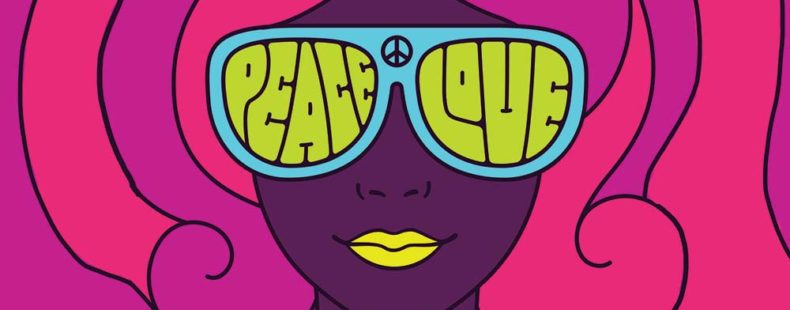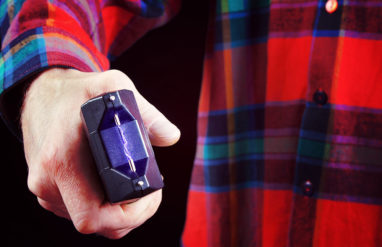Cool or squaresville?
The 1960s roiled with cultural and political change, and the language was as colorful as the tie-dye. Here’s a look at some words that have endured, and some that are better left in the patchouli-scented dustbin of history.

The 1960s roiled with cultural and political change, and the language was as colorful as the tie-dye. Here’s a look at some words that have endured, and some that are better left in the patchouli-scented dustbin of history.
From the old French establissement, meaning “an act or process of establishing,” the use of the capitalized word Establishment in conjunction with the is now commonly used to describe the entrenched ruling class.The Establishment became the top target in the 60s of youthful revolutions around the world, especially in the United States. And, it’s recently made a resurgence, especially in the 2016 presidential race, where ideas that were antiestablishment hailed supreme. Looks like the Establishment has fallen out of popularity once again . . . stick it to the man.
Flower power was an ethos that defined the late ‘60s and early ’70s, and it referred to the hippie ideal of peace, “free love” (borne of the sexual revolution and the development of the birth control pill), and a respect for nature. A famous photo of the time depicts a young woman placing a daisy in the barrel of a police gun during an anti-Vietnam war protest. The power of the flower in action, right on.
It wasn’t just the heat—it was also the fuzz, the pigs, or the man. In a time of dramatically shifting social and political mores, clashes between law enforcement and frustrated, fearful young demonstrators were nearly a daily occurrence. And, that spewed a lot of colorful and derogatory names for police officers. Unfortunately, it seems like these types of clashes have become the norm once again. Black Lives Matter . . . Blue Lives Matter . . . we think its righteous to value every life.
On a lighter dictionary note, Pig has an interesting and debatable etymology, with some reports of the word as first applied to both police and “unlikeable people” in the 1800s, and another, popular—though widely dismissed—theory involving gas mask-wearing officers often seen at demonstrations.
The jazz jive of the 1930s gave us the word cat, meaning “a very hip male person, often a jazz musician.” But, it caught on big in the ‘60s, becoming part of everyday street lingo. “Check that cat; I saw him truckin’ down Venice Beach yesterday, with a super foxy chick on his arm.” Meow.
A term purloined from early American blues (Blind Boy Fuller sang, “Truckin’ My Blues Away” in the 1930s), truckin’ throughout the late ‘60s and early ’70s meant “to walk, or strut, with a certain goal or focus; the opposite of wandering aimlessly.”
The Grateful Dead song “Truckin’” helped popularize the word as did the underground cartoonist R. Crumb, whose “Keep on Truckin’” became iconic, much to his chagrin. We bet your yearbooks are full of this send-off.
A person who was decidedly not far out or groovy was square. In the jazz parlance of the 1940s, the word transformed to mean someone uptight and traditional, and not “with it.” The beatniks of the ‘50s and the hippies of the ‘60s embraced the word with gusto, and it lived on into the counterculture of the early ‘70s. “Be there or be square” is now most likely something you only hear your grandparents say.
When the Fab Four—also known as the Beatles—took the world by storm, their long hairstyle (it wasn’t manbun status, that’s for sure) was referred to as a mop top. References to the use of the word mop to refer to hair can be found as far back as the 1700s. Now, it’s used more often to refer to someone with a head of curly hair.
Both bread and dough were commonly used to refer to money in the ‘60s. It appears that dough was used to imply “money” as far back as the 1800s though. Sometimes money seems as necessary to life as food, so these synonyms seem pretty natural to us.
The great movie actor Humphrey Bogart often had a cigarette dangling from his lips, as if it were part of his anatomy. In 1968, the California band the Fraternity of Man wrote a song, “Don’t Bogart Me,” which became enormously popular after Dennis Hopper placed it in the counterculture film, “Easy Rider.”
The lyrics advise sharing, not bogarting, or “keeping to yourself,” a marijuana joint. We’re pretty sure this use of the word is still popular today . . . puff, puff, pass . . . you get the idea.
If you hear your grandmother referring to her thongs, stay away from the visual of her in risqué underwear! Thong once meant (and still does mean, in many circles), a flip-flop: a lightweight, inexpensive sandal that is held onto the foot with a—yes—thong between the first and second toes. (Same idea, different part of the body.)
Another word that embodied the hippie and youth culture . . . to be mellow meant “to be super relaxed and free of worry.” If you weren’t punching a time clock and living by the Establishment’s rules, you were free to be mellow and at ease—or maybe you just bogarted the joint again.
Here’s one that has a new meaning in today’s internet world. But pre-internet, in the ’60s, to be hacked meant you were righteously angry or aggravated. Hacked off is used occasionally today (It’s the opposite of mellow.)
To be righteous was to be inarguably upstanding, super cool—to be right on. And, right on was a term that could be used for anything that was good, on point, correct. This list has been pretty righteous so far, if we do say so ourselves.
Gas was mentioned earlier in the slideshow, but we thought this phrase deserved a mention all it’s own. The Rolling Stones immortalized the phrase it’s a gas, meaning “a fun time,” in their 1968 song “Jumpin’ Jack Flash.” Contrary to popular belief, the expression doesn’t have anything to do with nitrous oxide (laughing gas). It likely comes from the jazz term gasser, meaning “sensational.”
In the 60s, if you said, “I dig it,” you understood what was going on. It was common for someone to ask, “Can you dig it?,” after they stated an idea. And, even The Monkees jumped on board with their song titled just that (which appeared in the film Head). Depending on how you said the phrase, it could also mean “I like it” or “awesome.”
The usage comes from 1930s African American English. It’s thought to be slang for “digging,” in this case meaning “to get below the surface of things for knowledge or understanding.”
The expression sock it to me, meaning “give it to me,” was popularized in 1968 on “Rowan and Martin’s Laugh-in,” a year after it appeared in Aretha Franklin’s version of the song “Respect.” It can also sometimes have a sexual tone. And, in an attempt to connect with the youth, even Nixon used it in his presidential campaign in 1972 . . . not sexually, of course.
What a bummer, bummed out, or just plain bummed or bummer are all ’60s slang for “depressed or disappointed.”
The terms seem to come from the phrase bum rap, meaning “treated or punished unfairly,” and bum deal, or “an agreement or situation that isn’t good.” The word bummer comes from the German bummler, meaning “loafer,” as in a lazy person. This slide kind of feels like a real bummer; let’s keep truckin’ on to something less square.
The expression it’s snowing down south wasn’t about some rare climate event. It was a euphemistic way of saying “your slip is showing.” In the ’60s, it was common for women to wear slips under their dresses so the light didn’t show through them and to keep the fabric from clinging to their bodies. Most slips were white, and so . . . the reference to snow.
Similarly, it’s snowing up north means “your bra strap is showing.” Until recently, visible bra straps were an etiquette faux pas. Now, it’s fairly fashionable, except in professional settings or at formal occasions, right?
When baby boomers think hip, they may now be reminded of replacement surgery or arthritis. We kid, we kid.
Back in the 60s, the term was used for the especially cool as it meant “stylish, fashionable.” Hip was a common slang term among the African-American jazz scene, too. There are several explanations for the term, but most have been discredited. It had several other meanings in the 60s, such as “aware” and “in the know.” Jack Kerouac, whose book On the Road was embraced by a generation of Americans in the 60s, described his 1950s contemporaries as “the new American generation known as the ‘Hip’ (the ‘Knowing’).”
Playing off the last word, hippie had a rather rocky road to popularity. In the 1950s, hippie was an unauthentic hipster, or a white fan of jazz played by black musicians. They were not cool and the term was used with disdain. But in the early 60s, hippie came to mean a new generation of beatniks, a young person in the 50s belonging to the counterculture Beat Generation.
Hippies were counterculture, marijuana smoking, flower children from San Francisco’s Haight-Ashbury neighborhood and New York’s Greenwich Village. By the late 60s, the term described young people who rejected The Establishment, advocated love and nonviolence, and wore casual folksy clothing, beads, and headbands. Still sounds like the people in Haight-Ashbury to us.
Far out was an expression used by hippies in the 60s when something was “cool, great, fun, terrific, excellent, awesome, wonderful, or even strange.” A tie-dye shirt could be far out and so could an avant-garde movie. Far out was also a way of saying thanks. You’ve made it this far into our groovy 60s slideshow . . . far out, man.
Like other 60s expressions, far out comes from jazz lingo in the 1940s and 1950s, used to express progressive or innovative music and musicians.
Threads has a lot of definitions, including “a fiber used for sewing.” Today, it commonly means “a sequence of responses to an initial message board posting.” And, threading is “a way to remove unwanted facial hair.”
But in the 60s, threads was a jazz-and-jive term adopted by hippies to refer to their clothing. If hippies got some new threads, they likely shopped at an Army Surplus store. Other hippie threads included peasant blouses, granny dresses, and other colorful items made from natural fibers. Explains why so many vintage and eco-friendly clothing stores today have threads as part of their store name.
A chrome-dome is “a shiny bald head.” It also refers to a buzzcut, in which hair is clipped extremely close to the scalp. Men got this haircut when they joined the Army. Hippies protested against the Vietnam war, so a chrome-dome was a derogatory term for servicemen.
In the 60s, hippies, including men, favored long hair. Afros, which let hair return to their natural curl and texture, also became popular. Bald hippies separated themselves from chrome-domes by wearing headbands and by growing beards or long sideburns. And, we know we’ve seen that look come back recently.
Now that you’ve mastered the language of the 60s, why not jump back even further in time to learn how those dapper flappers spoke about dating and drinking in the 1920s. Here’s Words of the 20s: What Dapper Flappers Used To Say.
 YOU MIGHT ALSO LIKE
YOU MIGHT ALSO LIKE











